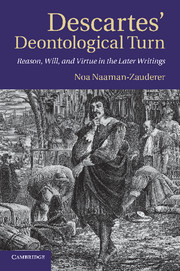Book contents
2 - Error in judgment
Published online by Cambridge University Press: 10 January 2011
Summary
By the end of the Third Meditation, Descartes establishes the existence of a veracious God and the resultant credibility of clear and distinct perception as a reliable mark of the truth. To complete this task, however, he must also show that the presence of error in human cognition is compatible with God's omnibenevolence. In the analytic order of the Meditations, as Martial Gueroult has admirably shown, the theodicy of error is required to safeguard divine veracity and thereby validate the Cartesian criterion of truth – clarity and distinctness – upon which the possibility of a firm and systematic science depends. Not surprisingly, therefore, Descartes asserts in the Synopsis of the Meditations that he has proven the truth of our clear and distinct perceptions in the Fourth Meditation (AT vii 15: CSM ii 11), and that “it was not possible to prove this before the Fourth Meditation” (AT vii 13: CSM ii 9). For the same reason, it is only in the concluding paragraph of the Fourth Meditation that he invokes the validity of his criterion of truth.
Clearly, then, when Descartes states at the outset of the Fourth Meditation that God cannot be a deceiver and therefore cannot be the author of his errors, he does not intend this assertion to serve as a premise of his argument but rather as the main conclusion he undertakes to substantiate. Descartes writes:
To begin with, I recognize that it is impossible that God should ever deceive me. For in every case of trickery or deception some imperfection is to be found; and although the ability to deceive appears to be an indication of cleverness or power, the will to deceive is undoubtedly evidence of malice or weakness, and so cannot apply to God. […]
- Type
- Chapter
- Information
- Descartes' Deontological TurnReason, Will, and Virtue in the Later Writings, pp. 61 - 100Publisher: Cambridge University PressPrint publication year: 2010

